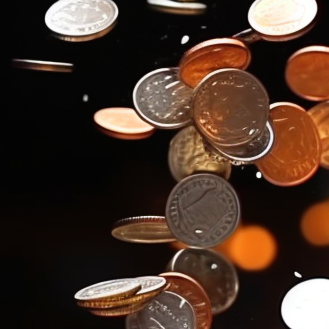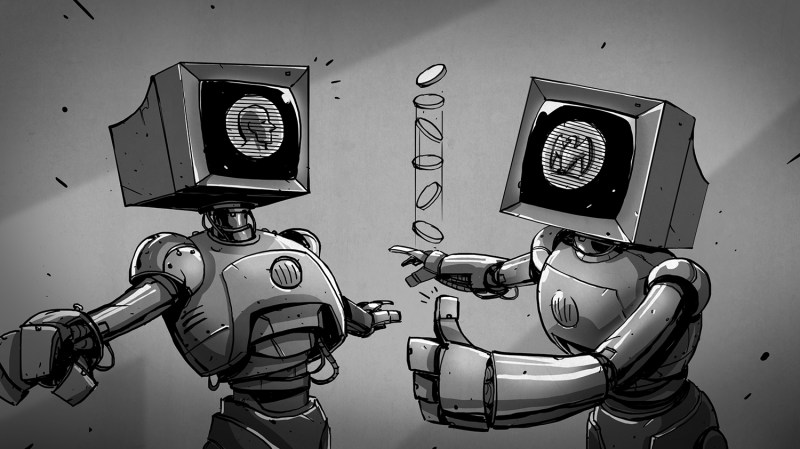A coin flip is considered by many to be the perfect 50/50 random event, even though — being an event subject to Newtonian physics — the results are in fact anything but random. But that’s okay, because what we really want when we flip a coin is an unpredictable but fair outcome. But what if that’s not actually what happens?
 There’s new research claiming that coin tosses demonstrate a slight but measurable bias toward landing on the same side they started. At least, this is true of coin flips done in a particular (but common) way. Coins flipped with the thumb and caught in the hand land with the same side facing up 50.8 percent of the time.
There’s new research claiming that coin tosses demonstrate a slight but measurable bias toward landing on the same side they started. At least, this is true of coin flips done in a particular (but common) way. Coins flipped with the thumb and caught in the hand land with the same side facing up 50.8 percent of the time.
The new research builds on earlier work proposing that because of human anatomy, when a human flips a coin with their thumb, the motion introduces a slight off-axis tilt that biases the results. Some people do it less (biasing the results less) and some do it more, but while the impact is small it is measurable. As long as the coin is caught in the hand, anyway. Allowing the coin to fall on surfaces introduces outside variables.
Therefore, one can gain a slight advantage in coin flips by looking at which side is facing up, and calling that same side. Remember that the flipping method used must be that of flipping the coin with the thumb, and catching it with the hand. The type of coin does not matter.
Does this mean a coin flip isn’t fair? Not really. Just allow the coin to fall on a surface instead of catching it in the hand, or simply conceal which side is “up” when the coin is called. It’s one more thing that invites us all to ask just how random is random, anyway?

















You also have to watch out for people who can flip the coin after it’s landed in their hand if they need to change which side is “UP”. Always let the coin fall on the ground or other surface if you want a fair outcome and don’t let anyone touch it before both sides look at the results.
nobody assumes a coin caught by hand is unbiased – it can be the exact opposite. I’ve got a friend who can flip a coin, it spins in the air, and he can can get heads (or tails) 95%+ of the time) by catching it in his hand (and that isn’t by flipping it to the other hand if the ‘wrong’ result)…
The only fair way is to flip it up quite a bit (and spin) and then land on the ground hard enough to bounce. Period.
…most Aussies catch the coin then whack it on to their other wrist in one swift move, and thusly during this practise, turning the coin once more. Therefore, I’d assume, if heads is up prior to tossing, call tails.
Of course, the coins spin backwards in the southern hemisphere… Coriolis and all :P
What happens to the probability when the coin lands on its side; neither heads, nor tails?
in that case: simple retry,
but be aware: you might in the unlikely loop of near infinite “Coin on side” event loop
Wait for a gust of wind or shocks to the ground to knock it over. Side position isn’t stable. Especially on slippery surfaces. Eventually it will fall over. Or try again, but like Tilo said this will create an unlike chance of this repeating.
Nothing to the probabilities.
But, you get telepathic capabilities, as outlined in this Twilight Zone episode. ;)
https://www.imdb.com/title/tt0734546/
The person who called ‘edge’ wins.
I’m surprised that the heat dissipation of the hand or quantum physics aren’t being mentioned.
The varying rotation speed of earth and the air pressure surely must have been at work, too. ;)
I’ve often wondered if the design of the coin could slightly influence to the odds. Factors such as the air turbulence from what is stamped on it and the milling of the edges. Or what if the coin is slightly bent? Any such effects though would likely be very small and smaller than 0.8%.
As long as the person tossing the coin, doesn’t show the caller which side is up before the toss, then it shouldn’t matter.
probbaly
landing up 50.8 %
landing down 49.00%
landing sideways 0.2%
i reckon
OK, you got the d2 down, now do the d4, d6, d8, d10, d12, and d20 so I can understand why my dice were cursed playing RPG’s in high school…
https://www.dicegamedepot.com/dice-n-games-blog/dice-odds-for-every-type-d4-d6-d8-d10-d12-d20/
https://medium.com/swlh/dice-roll-distributions-statistics-and-the-importance-of-runtime-efficiency-d8ce3402db15
They’ve done that already, too. I delved into reading up on it when making an RPG and dice probablility is a very detailed field that you could go down a long hole digging into. Pretty neat, though. The 2nd link is the most mathematically detailed out of the two.
All my comments were deleted not sure why but this non-peer reviewed paper said some people didn’t have bod and some did up to 50.8% which is way different than a everyone being biased. It also says the effect is eliminated if you call it before the flip. To me this means people are cheating consciously or subconsciously somehow.
“the effect is eliminated if you call it before the flip”
Although, the flipper would also need to have no knowledge of what the caller has chosen, otherwise they could adjust the coin to effect the outcome in favor for or against the caller.
Weird, my comment was posted in reply to: https://hackaday.com/2023/10/25/that-coin-toss-isnt-actually-50-50/#comment-6694004
For the last two days the page was rendering it under the correct comment. And today is now rendered under some random comment.
Looks like the comment system used by HaD has serious issues (like more serious that before…) like data corruption…
Or somebody is abusing the moderation system and then re-posting delete comments randomly… ?!
NGL…I’ve kinda always known this. I’ve long been able to flip coins and gues where they land in my hand with a high probability based on how/when they land in my hand. I don’t know how to explain it but it’s like counting seconds in your head.